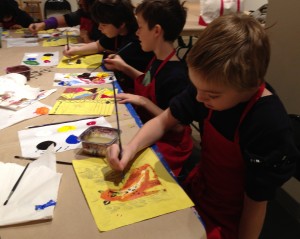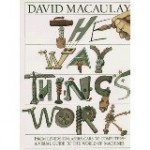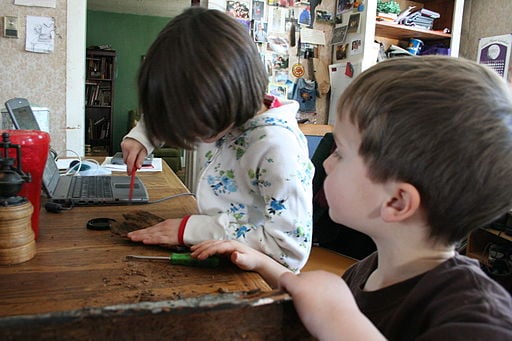 We’ve been asking the kids for several weeks, “Is this your best work?
We’ve been asking the kids for several weeks, “Is this your best work?
Invariably, they say yes and invariably the true answer is no. And invariably, I find it disheartening.
The humanities class I co-teach worked with a teacher at the MFA for three weeks to paint covers for the folktales they are writing. They were making Tinga Tinga-style paintings, and it was a blast. But they didn’t have time to finish them in the three weeks, and when Zach and I sat down to look at his yesterday, he declared, “I think it’s good. I don’t need to do any more.”
“But, Zach, this cover is going to be on your book forever. And it’s such a beautiful painting. Don’t you want to finish it?”
“What’s not finished?”
“Well, there’s all this blank space that shows the yellow construction paper. And a Tinga Tinga-style painting is saturated with color. And your border is done in colored pencil. I think it would look better with paint, especially since it’s Tinga Tinga-style. And Jake (the MFA teacher) suggested that you outline it in black and break up the grass with another color.”
“I think it’s fine the way it is.”
Aaaaaaaahhhhhhhh!
This was not a case of him truly loving his art. This was a case of wanting to be done. Did I mention that I find this disheartening?
How to help you kids have a desire to do their very best work is a mystery to me. So instead, I insisted he do more work on it. And as he finished each improvement, I insisted that he do another. At points, I picked up a brush and showed him how to get a straighter line or how to break up the green with yellow to make it look more like grass. Jeff walked by at one of these points and said, “Isn’t this his painting. Why do you have a brush?”
There is something to this, of course. But I feel slightly different about art than most people. If I took out a pen and corrected his grammar or suggested a more elegant way to say something, no one would flinch. But we have this weird idea that art is somehow so unique and so personal that it can’t be touched by anyone other than the artist.
But art, like calculus, has techniques, and they can be taught. Not everyone will have the talent or passion to become an artist for a living, just like not everyone will become a mathematician; but everyone can be taught the basics if they are willing to work hard. I don’t insert myself into his art when he picks it up on his own and wants to muck around. But when the assignment is to do something Tinga Tinga-like, he needs to try his best to fill the page with bright colors and patterns.
And the truth is that the boys react to my corrections and guidance in math and writing the same as they do in artistic pursuits. Did I say that I find this disheartening?
I’m sure that un-schoolers would tell me that I need to back off and let them own the project for themselves. After one too many edits to his report, Zach will yell, “Fine, then this is your report, not mine. I’m not putting my name on it.”
When it’s done, however, he’s really proud of it. Yesterday, after working for two hours on his painting, he showed it to everyone with a beaming smile. So was I wrong to push him to keep going?
So here’s my question to you all. How do you encourage excellence and hard work without taking over and disempowering your children?
____________________
Since I’m chronicling a month of homeschool days, here’s what else we did today:
They practiced piano.
The boys wrote out bullet points about each of the African kingdoms we’ve studied, and added them to the scrapbooks that are due next Monday.
They listened to four chapters of Tom Sawyer on tape.












